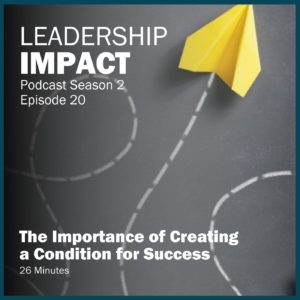
Most of the time, we think of accountability as what happens “after-the-fact” — once something has gone wrong and it’s time to ferret out the responsible party. The trouble is, this doesn’t give us the opportunity to intervene before we have missed the mark on what we set out to achieve in the first place! Join Kari Zeller (FKA Granger) and Paul Adams as they explore an alternative: accountability could, instead, be the set of perspectives and practices that we employ to maintain a condition for success. When we reallocate our concern and attention from after-the-fact to before-the-fact, we can intervene in performance quickly and stay on-course to achieve our mission.
In This Episode:
00:55 – Introducing today’s topic: The Importance of Creating a Condition for Success
02:01 – An example of working with clients when their interest waned on their commitments
05:47 – An example of trying to mitigate against the fallout of after-the-fact accountability
07:27 – The ‘Mission Capable’ metaphor: FMC, PMC, & NMC
10:42 – A different model of accountability
15:03 – Advice for those looking to reset accountability among their team — get curious about organization, context, and skill.
17:32 – The Mission Control Productivity and Accomplishment Course
18:42 – The importance of establishing and maintaining the big picture context for our actions
20:06 – The importance of keeping the mission in mind
22:23 – Paul identifies strategies his company, Sound Financial Group, uses to help clients produce the best vision for their future
22:40 – An artful approach to meaningful feedback
Quotes:
 LEADERSHIP IMPACT PODCAST
LEADERSHIP IMPACT PODCAST
See more episodes
Other places to find us:
- Apple Podcasts
- Audible
- Libsyn
- (Or wherever you listen to podcasts!)
Links:
- Kari’s Website
- Paul’s Website
- Kari’s Online Courses about Leadership Performance, Accountability, and Trust
- Paul’s Other Podcast: Your Business Your Wealth
Acknowledgements:
Our work is mosaic art. We read, study, and practice many philosophies, methodologies, and modalities of human performance, to ensure that our approach best serves our clients. We would like to acknowledge all of the thought leaders and organizations, whose ground-breaking work has influenced the TGN Consulting approach – especially Fernando Flores, Jim Selman, Michael C. Jensen, Julio Olalla, Pluralistic Networks, The Newfield Network, and the Strozzi Institute.


Podcast production and marketing provided by FullCast.

